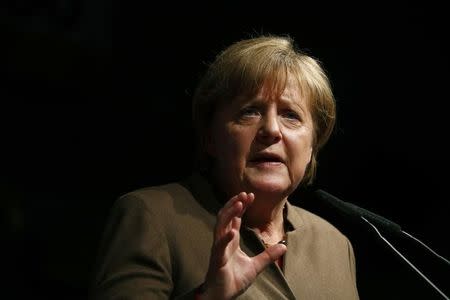Support for Merkel rises, but doubts over refugee policy remain

BERLIN (Reuters) - Popular support for German Chancellor Angela Merkel has bounced back after hitting a 4-1/2 year low in February, a poll indicated on Monday, but a majority of voters are still sceptical her government will be able to reduce the refugee influx soon. Merkel has come under increasing pressure to reduce the number of migrants after 1.1 million entered Germany last year, and the centre-right leader herself has said she is currently facing the biggest challenge of her decade in office. The survey for public broadcaster ARD, conducted by pollster Infratest-dimap on Feb 26-27, had popular support for Merkel rising to 54 percent from 46 percent in the previous month. At the same time, support for Bavarian State Premier Horst Seehofer, one of Merkel's harshest critics in the refugee debate, plunged to 38 percent from 45 percent. Still, nearly 60 percent of the 1,005 polled voters said they were unsatisfied with the government's refugee policy while roughly 40 percent said Berlin was doing a good job. Merkel is struggling to secure a Europe-wide plan for dealing with the migrants. She is pinning her hopes on talks between European Union leaders and Turkey on March 7 and a migration summit on March 18 and 19. In the survey, a large majority (77 percent) welcomed the approach to push for a European solution, but only a third (32 percent) said such a plan would work and soon yield results. Nearly two out of three polled voters (63 percent) said Germany should introduce a national cap to limit the refugee influx. Speaking at an event of her centre-right CDU party in the central town of Volkmarsen, Merkel defended her open-door policy for migrants and rejected the idea of closing borders to better control the numbers of refugees allowed into the country. On Sunday, Merkel said there was no 'Plan B' for her aim of reducing the flow of migrants through cooperation with Turkey, efforts she said could unravel were Germany to cap the number of refugees it accepts. (Reporting by Michael Nienaber; editing by Ralph Boulton)

